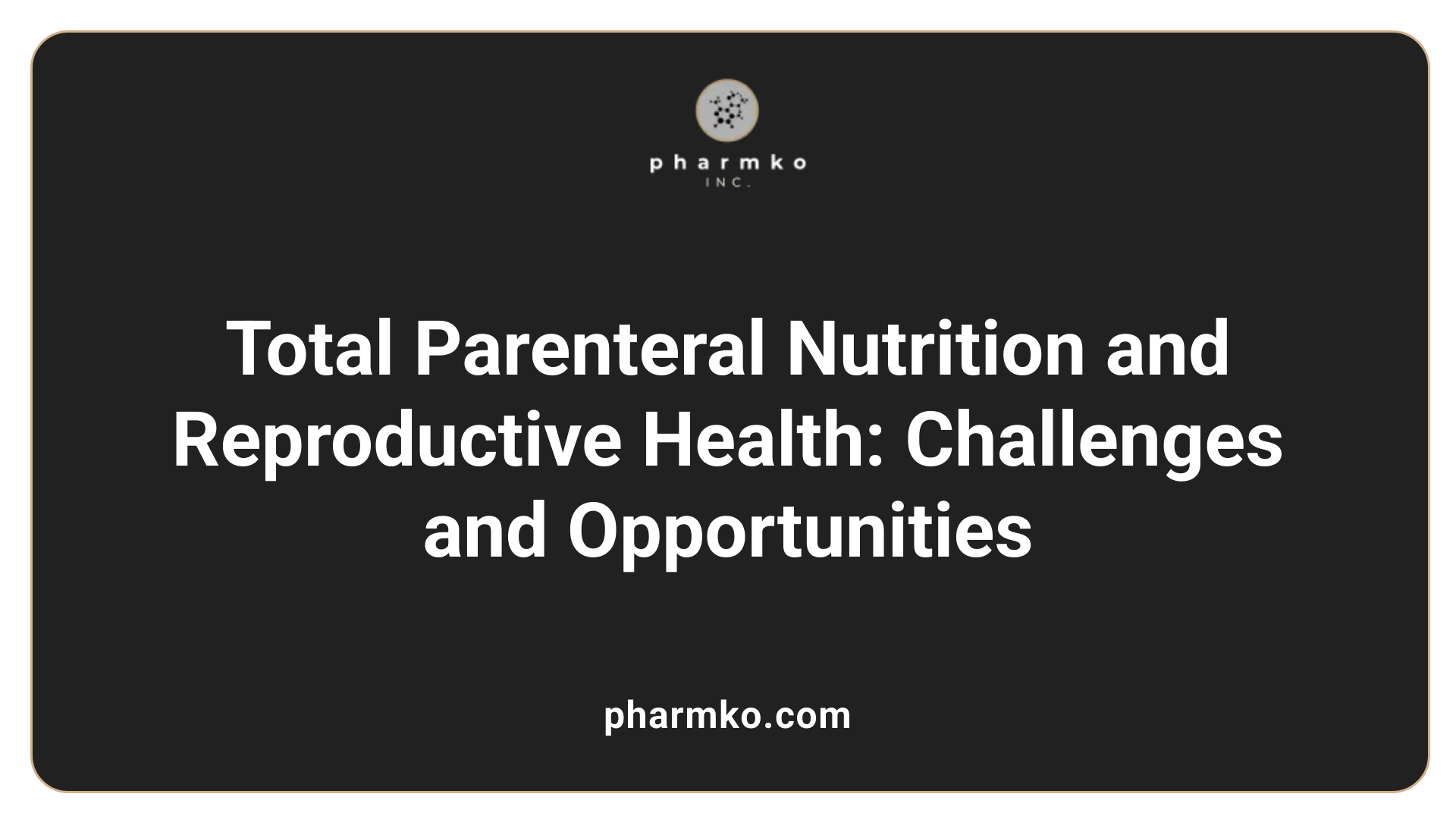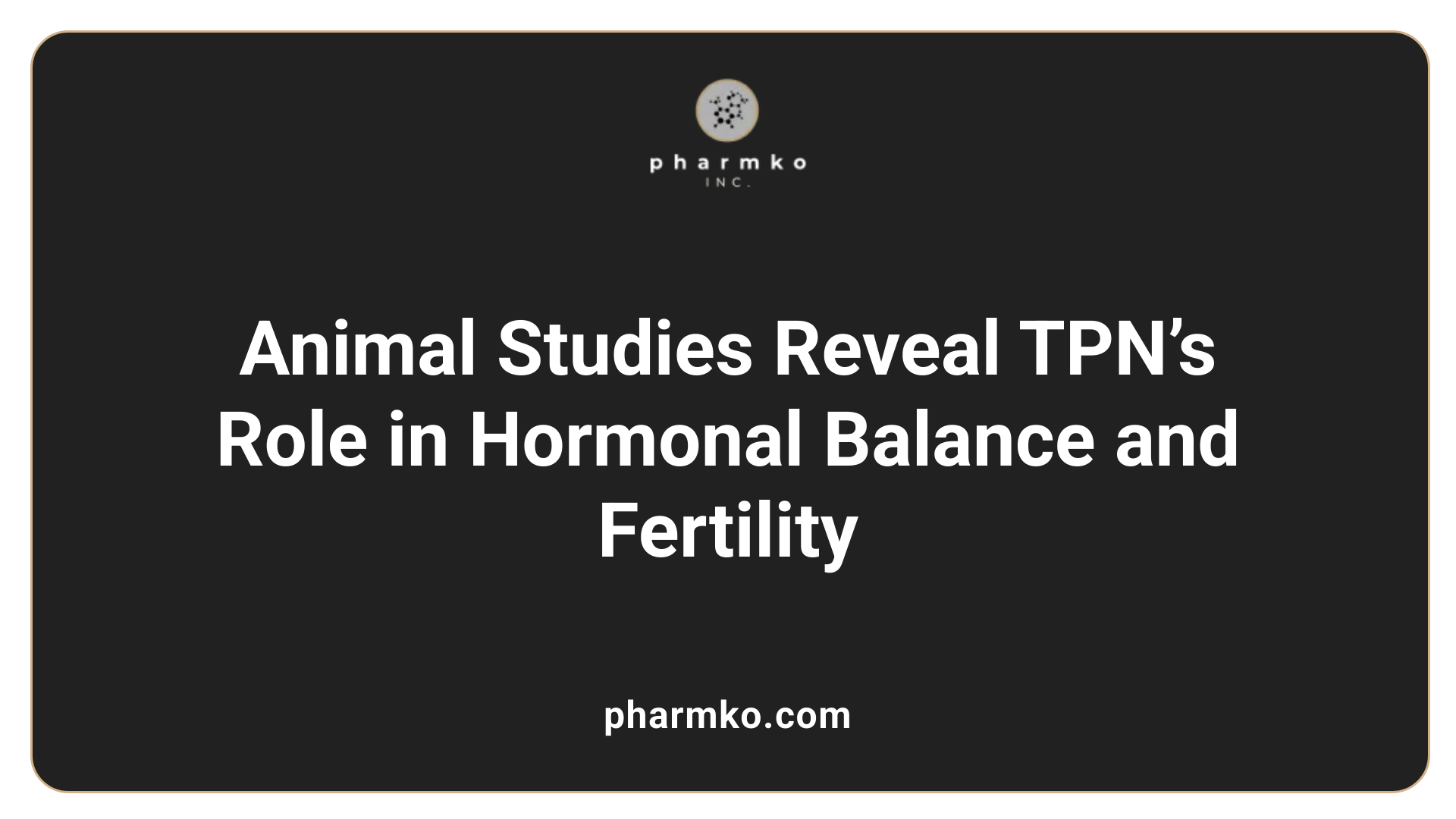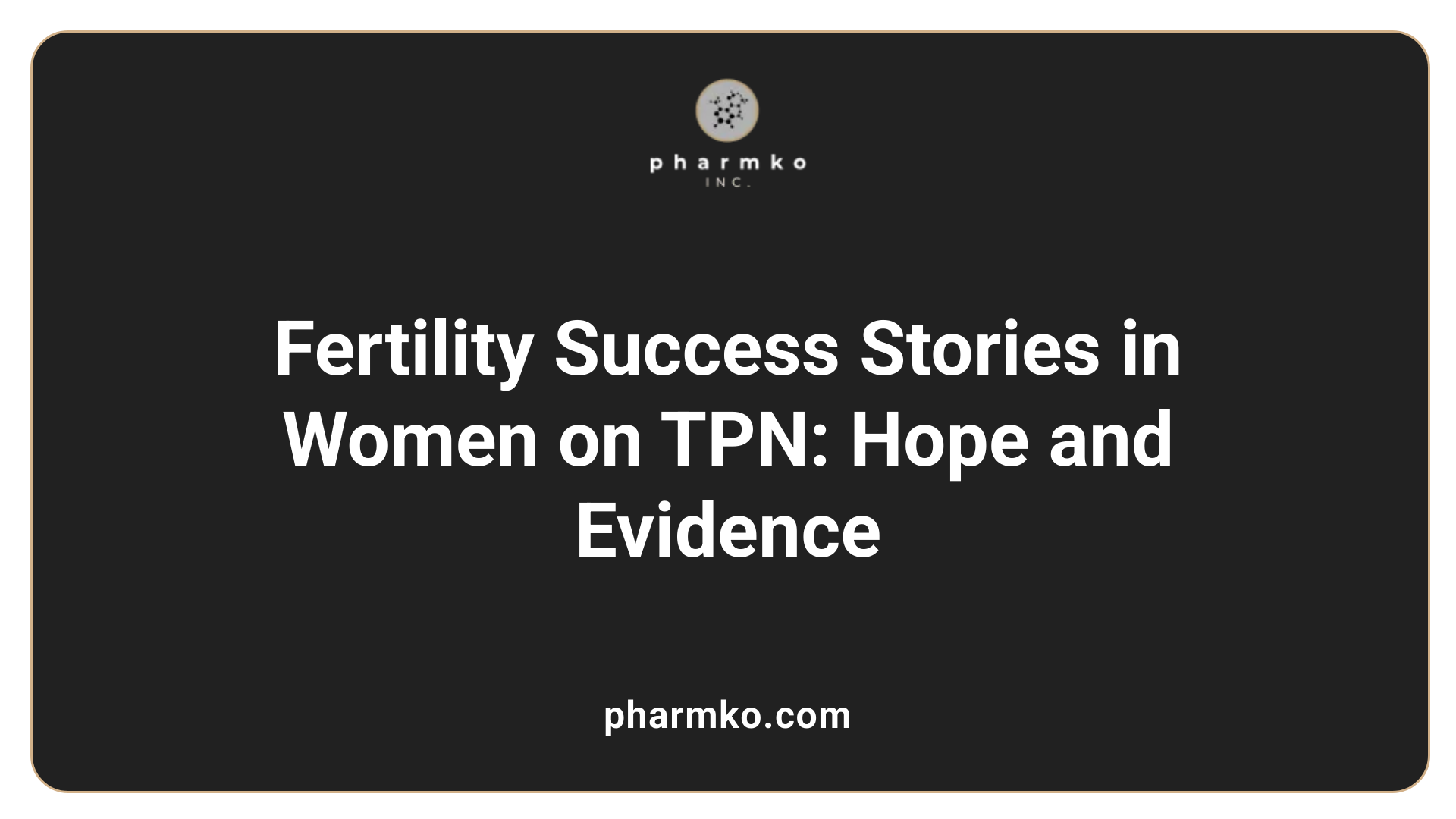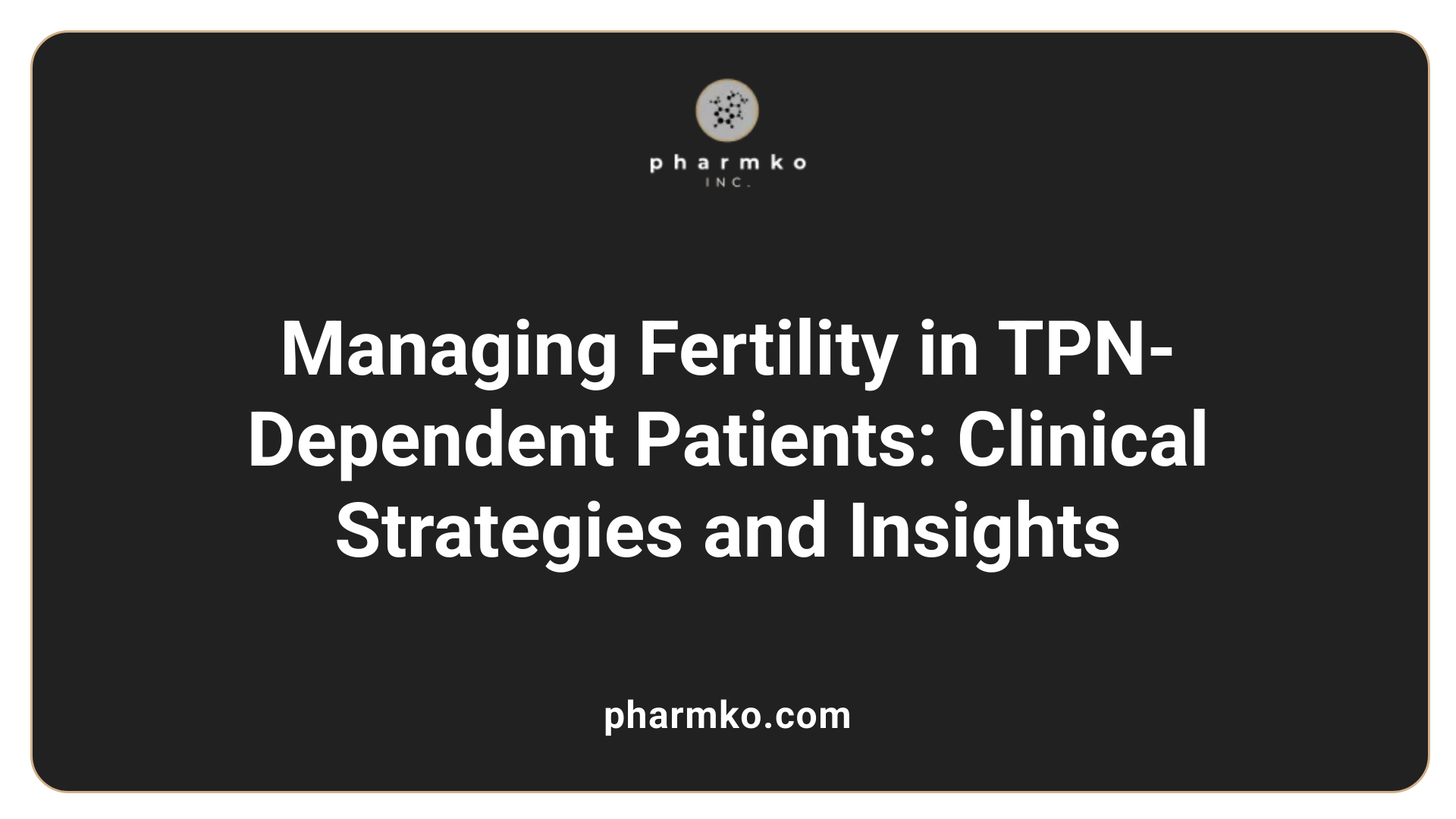The Impact of TPN on Hormonal Regulation in Fertility Patients
Understanding the Role of Nutrition in Hormonal Balance and Fertility
Nutritional status plays a pivotal role in regulating reproductive hormones and, consequently, fertility outcomes. Among various nutritional strategies, Total Parenteral Nutrition (TPN) has emerged as a critical intervention for patients with complex gastrointestinal conditions, yet its influence on hormonal regulation remains nuanced and multifaceted. This article delves into the physiological impacts, research insights, and clinical implications surrounding TPN and hormonal regulation in fertility patients.
Introduction to TPN and Reproductive Challenges
 Total Parenteral Nutrition (TPN) is a specialized method of delivering nutrients directly into the bloodstream, bypassing the gastrointestinal tract. This technique is vital for patients with conditions that impair normal digestion and absorption, such as short bowel syndrome (SBS), inflammatory bowel disease, and extensive bowel resection leading to chronic intestinal failure. These conditions can severely disrupt nutritional balance and, consequently, reproductive health.
Total Parenteral Nutrition (TPN) is a specialized method of delivering nutrients directly into the bloodstream, bypassing the gastrointestinal tract. This technique is vital for patients with conditions that impair normal digestion and absorption, such as short bowel syndrome (SBS), inflammatory bowel disease, and extensive bowel resection leading to chronic intestinal failure. These conditions can severely disrupt nutritional balance and, consequently, reproductive health.
In patients with SBS, bowel failure, or similar disorders, TPN provides essential nutrients to sustain life and support recovery. However, these underlying conditions and the nutritional therapies themselves can influence reproductive function. Women with significant intestinal impairment often face challenges related to hormonal imbalances, decreased fertility, and increased risks during pregnancy.
Reproductive disruptions in such patients may stem from nutritional deficiencies, particularly of vitamins and minerals, which are critical for hormone production and regulation. For instance, deficiencies in vitamin D, zinc, and folic acid can impair hormonal secretion and follicular development. Furthermore, nutritional deficits can cause hormonal dysregulation involving key reproductive hormones like luteinizing hormone (LH), follicle-stimulating hormone (FSH), estrogen, and testosterone, affecting ovulation and fertility.
While TPN is a therapeutic lifeline, it can also be associated with complications that influence reproductive health. These include risks of liver dysfunction, metabolic disturbances, and malnutrition—all of which can impair hormonal balance. For example, inadequate nutrient intake has been shown to decrease serum levels of reproductive hormones, leading to subfertility or miscarriage.
To understand the implications of TPN on reproductive health, researchers have employed animal models. Studies using rats fed via TPN demonstrate that, despite nutritional interventions, LH levels can remain stable and responsive, indicating that TPN might not inherently impair some aspects of hormonal regulation over short periods. Alternatively, in humans, the impact of TPN on fertility is multifaceted and depends on nutritional adequacy, management of complications, and ongoing monitoring.
Managing pregnancies in women dependent on TPN requires a multidisciplinary approach. Obstetricians, gastroenterologists, nutritionists, pharmacists, and other healthcare professionals collaborate to optimize nutritional status, monitor hormonal health, and ensure fetal well-being. This comprehensive management is essential because nutritional deficiencies or excesses can further disturb hormonal balance, affecting ovulation, conception, and pregnancy outcomes.
In summary, TPN plays a critical role in sustaining patients with severe gastrointestinal conditions but also presents challenges to reproductive health. Ensuring adequate nutrient delivery and vigilant monitoring can help mitigate negative effects on hormonal regulation, supporting fertility and healthy pregnancies in this vulnerable population.
Physiological Impact of TPN on Hormonal Secretion in Animal Models

How does nutrition, specifically TPN, modulate hormonal regulation and fertility outcomes?
Total parenteral nutrition (TPN) plays a crucial role in maintaining hormonal health, especially in patients unable to consume nutrients orally due to conditions like short bowel syndrome or intestinal failure. In animal studies, particularly using rat models, researchers have explored how TPN influences reproductive hormones such as luteinizing hormone (LH), testosterone, and cortisol.
One prominent study employed a rat TPN model designed to minimize the stress of surgery and restraint. Findings indicated that rats receiving TPN maintained body weight and plasma LH levels comparable to control animals that ate normally. This suggests that, under controlled conditions, TPN does not inherently impair LH secretion.
Interestingly, during TPN infusions, there was a noted increase in urinary LH excretion. However, this was attributed to an increase in urine output rather than a direct effect of TPN on hormone secretion. Conversely, plasma testosterone and cortisol levels remained stable, implying that nutritional support via TPN sustains hormonal balance essential for reproductive function.
The importance of adequate nutrient provision is further underscored by research on nutritional deficiencies. Severe deficits can suppress LH and testosterone secretion, disrupting normal hormonal regulation necessary for ovulation and spermatogenesis. Adequate inclusion of vital nutrients such as vitamins D and iodine, antioxidants, omega-3 fatty acids, and folic acid in TPN formulations supports endocrine health and fertility.
Moreover, the study demonstrates that TPN can serve as an effective platform for investigating the intricate relationship between nutrition and reproductive endocrinology. The rat model allows researchers to control variables precisely, providing insights into how specific nutrients influence hormonal pathways.
Findings related to plasma LH, testosterone, and cortisol levels during TPN infusions
| Hormone | Change observed during TPN | Notes | Implication |
|---|---|---|---|
| LH | Maintained stable in plasma | Urinary excretion increased due to urine output | TPN does not impair LH secretion; urine output affects measurements |
| Testosterone | No significant change or decrease | Stable levels suggest maintained testicular function | Supports fertility in nutritionally supported conditions |
| Cortisol | Remained stable | No evidence of stress-induced alterations | Adequate TPN formulation avoids stress-related hormonal disruption |
Implications for understanding hormonal regulation in humans
These animal studies highlight the potential for TPN to support or even restore hormonal balance crucial for fertility. Maintaining adequate nutrient intake through TPN can prevent endocrine disruptions often seen in malnourished or critically ill patients.
In humans, this translates to the importance of carefully formulated TPN that meets the nutritional needs essential for hormonal health, particularly in women seeking fertility or managing pregnancy. Proper nutritional support may help preserve ovarian function, prevent miscarriage, and promote successful conception.
Multidisciplinary management involving endocrinologists, nutritionists, and reproductive specialists ensures that patients on TPN receive tailored therapy supporting hormonal harmony. Although direct human evidence continues to grow, the insights gained from animal models provide a valuable foundation for advancing reproductive nutrition and hormonal regulation strategies.
Human Studies and Fertility Outcomes with TPN

Case studies of women on TPN conceiving successfully
Recent case reports have highlighted women with severe intestinal failures, such as short bowel syndrome (SBS) and other gastrointestinal conditions, who relied on total parenteral nutrition (TPN) and yet managed to conceive and carry pregnancies successfully. These cases demonstrate that fertility, though traditionally challenged in patients with significant bowel resections or inflammatory bowel disease, can be achieved with comprehensive medical and nutritional management. For instance, women dependent on TPN were able to reach various stages of pregnancy without notable complications, emphasizing the potential for reproductive success even in complex clinical scenarios.
Health conditions like SBS, inflammatory bowel disease, and bowel resection leading to fertility challenges
Conditions such as SBS, inflammatory bowel disease, and extensive bowel resections impact digestive efficiency, often resulting in nutritional deficiencies. These deficiencies can disrupt hormonal regulation, which is crucial for fertility. Bowel resection, in particular, may reduce the absorption of vital nutrients and hormones, leading to irregular menstrual cycles, subfertility, or even infertility. Furthermore, these patients are at increased risk for nutritional imbalances that impair oocyte quality and ovarian function.
Potential for subfertility and miscarriage linked to nutritional deficiencies
Nutritional deficits associated with TPN, such as deficiencies in vitamins and minerals, can adversely affect reproductive health. For example, deficiencies in vitamin D, iron, zinc, and folate have been linked to lower fertility rates and increased miscarriage risk. Nutritional imbalances can disrupt hormonal pathways, including luteinizing hormone (LH) secretion and ovarian hormone production, which are vital for ovulation and gestation.
Research exploring the hormonal effects of TPN shows that adequate nutrition is essential for maintaining optimal levels of reproductive hormones. Studies in animal models suggest that severe nutritional deficits can lead to decreased LH and testosterone secretion, impairing ovulation and fertility. Conversely, maintaining nutritional adequacy appears to support hormonal stability.
A notable study involving rats demonstrated that those supported with TPN maintained body weight and LH levels comparable to control groups, indicating that TPN, when properly managed, does not necessarily hinder hormonal regulation. During TPN infusions, transient increases in LH excretion were observed, but these were mainly due to increased urine output rather than the TPN itself.
In humans, managing pregnancies in TPN-dependent women involves a multidisciplinary team approach to optimize nutritional status and hormonal balance. This often includes obstetricians, gastroenterologists, dietitians, and pharmacists working together to tailor nutritional support, mitigating risks, and ensuring proper fetal development.
Furthermore, experimental models examining hormones such as ghrelin and orexin A in infants suggest that early nutrition, including breastfeeding and formulas—especially parenteral nutrition—can influence long-term hormone regulation. These hormones regulate appetite and energy balance, which may have downstream effects on fertility.
In summary, while nutritional deficiencies related to TPN can negatively impact fertility, with appropriate medical oversight and nutritional management, women dependent on TPN can achieve successful pregnancies. Ongoing research continues to elucidate the mechanisms and optimize strategies for supporting fertility in this vulnerable population.
Clinical Implications of TPN-Induced Hormonal Changes in Fertility Management

What are the clinical implications of TPN-induced hormonal changes for fertility treatment?
Total Parenteral Nutrition (TPN) plays a vital role in supporting patients with severe gastrointestinal conditions such as short bowel syndrome and chronic intestinal failure. However, its influence on reproductive health is complex. Nutritional deficiencies caused by TPN—particularly deficiencies in vitamins and minerals—can disrupt hormonal regulation that is essential for fertility. For instance, deficiencies in key nutrients may impair the secretion of hormones like luteinizing hormone (LH) and testosterone, critical for ovulation and overall reproductive function.
Despite these challenges, case studies have demonstrated that women dependent on long-term TPN can conceive and carry pregnancies successfully. Proper management of nutritional intake, combined with a multidisciplinary approach, including obstetricians, gastroenterologists, nutritionists, and pharmacists, is crucial for optimizing reproductive outcomes.
Evidence from animal and human studies indicates that TPN, when adequately managed, does not necessarily adversely affect hormonal levels such as LH. In fact, studies using rat models show that with maintained nutritional balance, LH levels remain comparable to those in healthy controls. Additionally, hormone profiles in children receiving TPN reflect normal post-meal hormone fluctuations, reinforcing that well-managed TPN can support normal hormonal function.
However, TPN's potential to cause nutritional deficiencies means careful monitoring is essential. Deficiencies in micronutrients can lead to subfertility, increased miscarriage risk, and hormonal imbalance. Therefore, personalized nutritional strategies are vital to prevent these issues.
Given these considerations, fertility treatment in patients on TPN should be conducted within a comprehensive care framework. This includes regular assessment of nutritional status, hormone levels, and reproductive health, alongside ongoing monitoring for complications like infections or metabolic disturbances.
Managing pregnancies in patients on TPN requires a multidisciplinary approach involving obstetricians, gastroenterologists, nutritionists, pharmacists, and other healthcare providers.
A collaborative approach ensures that maternal and fetal health are optimized during pregnancy. It supports continuous nutritional adjustment, infection prevention, and hormonal management tailored to the patient’s evolving needs. Such an approach not only enhances the chances of successful conception but also promotes healthy pregnancy progression and delivery.
The potential for successful pregnancies with proper management
Although TPN presents certain risks related to nutritional deficiencies and hormonal disruption, evidence suggests that with careful management, women dependent on TPN can achieve successful pregnancies. Cases of women carrying pregnancies to various stages without complications highlight the potential of individualized care plans.
Living proof is found in case studies where infants delivered from mothers on long-term TPN displayed no apparent abnormalities, emphasizing the importance of holistic patient management.
In conclusion, while TPN–induced hormonal changes may pose challenges for fertility, they are not insurmountable. Advances in nutritional support, vigilant monitoring, and a comprehensive, multidisciplinary approach increase the likelihood of positive reproductive outcomes and healthy pregnancies.
Mechanisms of TPN's Influence on Reproductive Hormones
What mechanisms and pathways does TPN use to influence reproductive hormones?
Total parenteral nutrition (TPN) affects reproductive hormones through multiple interconnected pathways that involve nutrition, metabolism, and endocrine regulation. Understanding these mechanisms provides insight into how nutritional support can impact fertility and hormonal balance.
First, TPN supplies vital nutrients directly into the bloodstream, bypassing the gastrointestinal tract. This nutritional support is crucial for maintaining normal metabolic functions. When nutrition is adequate, it supports the normal secretion of hormones like luteinizing hormone (LH) and testosterone, which are central to reproductive health.
However, nutritional deficiencies that can occur with TPN—such as deficiencies in vitamins and minerals—may disrupt hormonal regulation. These deficiencies can impair the secretion of reproductive hormones by affecting the function of endocrine glands, including the hypothalamus and pituitary. For example, a lack of specific micronutrients may lead to diminished LH secretion, which is essential for ovulation and sperm production.
Beyond direct nutritional impacts, TPN-induced metabolic disturbances also play a role. Conditions like insulin resistance and altered liver function—common in patients on prolonged TPN—can influence hormone levels. Insulin resistance has particular relevance in conditions like Polycystic Ovary Syndrome (PCOS), where it contributes to hyperandrogenism and disrupted ovulation.
Further complexity arises from the gut microbiota’s role. TPN omits the normal enteral stimulation of the gut, leading to changes in microbial composition. Recent research suggests that gut microbiota produce metabolites such as indole-3-acetic acid (IAA), which activates the aryl hydrocarbon receptor (AhR). Activation of AhR influences immune function and hormone regulation, including those involved in reproductive processes.
Additionally, TPN may alter other signaling pathways such as the hypothalamic-pituitary-gonadal (HPG) axis. Nutritional status directly affects hypothalamic secretion of gonadotropin-releasing hormone (GnRH), which regulates LH and FSH secretion from the pituitary.
In summary, TPN influences reproductive hormones through a multifaceted network:
- Supporting or disrupting nutritional and micronutrient levels necessary for hormone synthesis.
- Modulating metabolic pathways, including insulin signaling and liver function.
- Altering gut microbiota and microbial metabolites that participate in hormone regulation.
- Affecting the hypothalamic-pituitary axis directly through nutritional signals.
These complex interactions highlight the importance of meticulous nutritional management in patients dependent on TPN to preserve reproductive health and hormonal balance.
Nutritional Deficiencies and Hormonal Disruption
What are the effects of Total Parenteral Nutrition (TPN) on hormonal regulation related to fertility?
Total Parenteral Nutrition (TPN) is often a vital intervention for patients with severe gastrointestinal issues, such as short bowel syndrome, inflammatory bowel disease, or those who have undergone extensive bowel resection leading to intestinal failure. While TPN provides essential nutrients directly into the bloodstream, its influence on hormonal regulation related to reproductive health is complex.
In cases of severe nutritional deficiency, which can occur if TPN is not properly managed, there may be a reduction in the secretion of reproductive hormones like luteinizing hormone (LH) and testosterone. Such hormonal disruptions can impair fertility and increase the risk of miscarriage. Nutrient deficiencies, particularly of vitamins and minerals, are known to disturb hormonal balance, affecting reproductive functions.
Recent research using a rat model sheds light on this dynamic. The study demonstrated that rats maintained on TPN showed similar body weight gain and plasma LH concentrations compared to control rats, implying that short-term TPN does not necessarily harm LH levels. Interestingly, during TPN infusions, an increase in LH excretion was observed, but this was linked primarily to increased urine output rather than a direct effect of the nutritional therapy itself.
In humans, TPN-related complications such as liver dysfunction and ongoing malnutrition can further complicate hormonal regulation. These issues may indirectly impair reproductive hormones, leading to subfertility or increased miscarriage risk. Therefore, the overall impact of TPN on fertility depends heavily on the individual’s nutritional status and the vigilant management of potential deficiencies and complications.
Proper monitoring, nutritional optimization, and multidisciplinary care are essential for women relying on TPN who wish to conceive. Ensuring adequate vitamin and mineral intake, along with addressing any associated metabolic or organ-specific issues, can help maintain hormonal balance and support reproductive health.
This evidence underscores the importance of personalized nutritional support and highlights the need for ongoing research into the adjustments required for optimal hormonal and fertility outcomes in patients dependent on TPN.
The Role of Gut Microbiota and Hormonal Regulation
What mechanisms and pathways does TPN use to influence reproductive hormones?
Total parenteral nutrition (TPN) significantly affects reproductive endocrine function mainly through its influence on metabolic and hormonal pathways that depend on nutritional status. When properly balanced, TPN supplies essential nutrients that support the normal secretion of key reproductive hormones such as luteinizing hormone (LH) and testosterone.
However, nutritional deficiencies or imbalances associated with TPN can suppress these hormones, leading to subfertility or miscarriage. For instance, deficiencies in vitamins and minerals vital for hormone synthesis can create hormonal imbalances. Moreover, TPN may cause metabolic disturbances such as insulin resistance, which affects the hypothalamic-pituitary-gonadal axis, thus impairing reproductive hormone regulation.
In addition to these direct effects, TPN influences the gut microbiota — the trillions of microbes residing in our gastrointestinal tract — which play a crucial role in modulating hormonal pathways. Microbial metabolites like indole-3-acetic acid (IAA) are produced by gut bacteria during fermentation of dietary components. These compounds can activate the aryl hydrocarbon receptor (AhR), a transcription factor with a role in immune regulation, detoxification, and hormone signaling.
Alterations in gut microbiota composition during TPN can lead to reduced levels of beneficial metabolites like IAA, which may diminish AhR activation. This reduction can disrupt hormonal balance, affecting pathways involved in metabolism and reproduction. Studies using rat models show that maintaining adequate nutrient intake via TPN sustains normal levels of reproductive hormones such as LH, with some evidence indicating that the absence or reduction of microbial metabolites could negatively impact reproductive function.
Furthermore, TPN-related changes in liver function and immune responses may also play a role in hormone regulation, as the liver is vital for hormone metabolism and clearance.
Overall, TPN influences reproductive hormones through multiple interconnected mechanisms: nutritional support or deficiency impacting hormone synthesis, metabolic health, changes in gut microbiota and microbial metabolites like IAA influencing hormone receptor activity, and systemic effects on liver and immune function. Maintaining optimal nutritional balance and supporting healthy microbiota are therefore essential considerations in patients dependent on TPN, especially when planning for pregnancy.
Below is a summarized comparison of how TPN influences reproductive hormone regulation through various pathways:
| Pathway | Effect | Underlying Mechanism | Additional Notes |
|---|---|---|---|
| Nutrient supply | Supports hormone production | Adequate vitamins and minerals synthesize hormones | Deficiency impairs hormone synthesis |
| Metabolic health | Affects hypothalamic-pituitary-gonadal axis | Insulin resistance alters hormonal feedback | TPN-induced metabolic disturbances could impair reproductive function |
| Gut microbiota | Modulates hormonal signaling | Microbial metabolites activate hormone receptors | Reduced microbial metabolites like IAA impair signaling |
| Liver function | Influences hormone metabolism | Liver detoxifies and metabolizes hormones | TPN effects on liver can indirectly affect hormone levels |
Understanding these pathways highlights the importance of personalized nutritional strategies and microbiota support in patients on TPN to optimize reproductive health.
A Case Report on Hormonal Management and Conception in Women with Overt POI
How is physiologic hormone replacement therapy used in women with Overt POI?
Physiologic hormone replacement therapy (P-HRT) employing transdermal estradiol combined with cyclic progestin has emerged as an effective approach to manage women suffering from Overt Premature Ovarian Insufficiency (POI). This therapy helps regulate hormonal imbalances by suppressing elevated serum luteinizing hormone (LH) levels, which are commonly observed in these patients.
By lowering LH levels, P-HRT can prevent premature follicular luteinization—a process where the follicles undergo luteinization too early, thereby impairing their ability to ovulate. Consequently, this suppression restores normal follicle function, increasing the chances of ovulation and potentially enabling pregnancy. In fact, a documented case highlights a woman with Overt POI who conceived and delivered a healthy baby following a regimen that included follicle monitoring and the use of physiologic hormone replacement therapy.
Women with Overt POI usually retain about 70% of their ovarian follicles intact. However, high LH levels resulting from the condition often cause inappropriate luteinization, which hampers follicular development and ovulation. Managing LH levels effectively can thus be instrumental in unlocking the reproductive potential of these women.
Hormonal Therapy and Fertility Enhancement in Ovarian Dysfunction
How does suppression of LH in POI contribute to fertility management?
In women diagnosed with Overt Primary Ovarian Insufficiency (POI), elevated levels of luteinizing hormone (LH) often trigger premature luteinization of developing ovarian follicles. This process impairs follicle development and reduces the chances of successful ovulation and pregnancy. An effective approach involves suppressing this excess LH to prevent follicle luteinization, thereby promoting healthier follicular growth and increasing the likelihood of ovulation.
In clinical practice, physiologic hormone replacement therapy (P-HRT), which typically includes transdermal estradiol and cyclic progestin, has been used to regulate hormonal levels. This therapy effectively lowers elevated LH levels, decreases follicular luteinization risks, and restores the hormonal environment conducive to ovulation.
What is the role of estrogen and progestin therapy in ovarian failure?
Estrogen and progestin therapy serve multiple purposes in managing ovarian dysfunction. Estrogen, notably delivered via transdermal patches, helps to alleviate menopausal-like symptoms such as hot flashes, osteoporosis, and vaginal dryness. More importantly, this therapy modulates and suppresses the secretion of gonadotropins, including LH, thus preventing follicle luteinization.
Cyclic progestin accompanies estrogen to mimic the natural luteal phase, supporting the endometrial lining and protecting against endometrial hyperplasia. Together, this hormone regimen can lower serum LH levels, creating a hormonal milieu similar to the natural cycle, and potentially stimulate follicular development.
Can you provide case studies of women who successfully conceived with hormonal therapy?
Recent case reports show that women with Overt POI, even with high FSH levels indicative of diminished ovarian reserve, can conceive and deliver healthy babies following targeted hormonal therapy. One such case involved using follicle monitoring combined with physiologic hormone replacement therapy tailored to suppress LH.
In this case, the woman received transdermal estradiol and cyclic progestin, which successfully suppressed her elevated LH levels and prevented premature follicle luteinization. With close ovarian monitoring, she achieved ovulation and conceived spontaneously, culminating in a healthy delivery.
These instances underscore the potential for hormonal management strategies to restore fertility in women with ovarian failure, emphasizing the importance of precise hormonal suppression and monitoring.
How do hormonal suppression strategies influence ovarian and reproductive health?
Suppressing excessive LH and restoring hormonal balance support the functional integrity of ovarian follicles. By preventing premature luteinization, these strategies help maintain follicles in a viable state capable of ovulation.
Effective hormonal management improves symptoms associated with hormonal imbalance, supports bone density, and enhances quality of life. Importantly, it opens avenues for spontaneous conception, even in women previously considered to have minimal chances of pregnancy.
| Aspect | Details | Additional Notes |
|---|---|---|
| Population | Women with Overt POI | Elevated FSH and LH levels |
| Treatment | Transdermal estradiol + cyclic progestin | Mimics natural cycle, suppresses LH |
| Outcome | Improved ovulation, pregnancy | Successful cases reported |
| Monitoring | Follicle tracking, hormonal levels | Ensures effective suppression |
Though not all women will conceive using this approach, these findings support hormonal suppression as a valuable component of reproductive management in ovarian failure.
Final thoughts
Targeted hormonal therapy can significantly impact fertility outcomes in women with ovarian dysfunction. Suppressing LH to prevent premature luteinization, combined with appropriate estrogen and progestin support, paves the way for potential spontaneous conception. Continued research and personalized treatment plans are essential for optimizing results in this patient population.
Importance of Multidisciplinary Approach in Fertility Management for TPN Patients
What are the clinical implications of TPN-induced hormonal changes for fertility treatment?
Total Parenteral Nutrition (TPN) is a critical intervention for patients with conditions like short bowel syndrome and chronic intestinal failure. While it sustains life by providing essential nutrients, TPN can influence hormonal regulation, which is vital for reproductive health.
Research into TPN's effects on hormones, especially in animal models, has shown that severe nutritional deficits can lower hormones like luteinizing hormone (LH) and testosterone, affecting fertility. However, in humans, findings suggest that with proper management, TPN does not necessarily impair hormonal balance. For instance, studies using rat models indicate that TPN does not significantly reduce LH levels, and during infusions, LH can even increase due to metabolic adjustments.
These hormonal changes have notable implications for fertility treatments. Nutritional deficiencies related to TPN, such as vitamin and mineral shortages, can cause hormonal disturbances leading to subfertility or miscarriage. For women with reproductive issues linked to nutritional deficits, addressing these imbalances becomes essential.
Implementing a comprehensive, multidisciplinary approach is crucial during pregnancy for women on TPN. By involving obstetricians, gastroenterologists, nutritionists, pharmacists, and other healthcare providers, clinicians can monitor and optimize maternal and fetal health.
Close monitoring allows for early detection of complications, such as infections, nutritional deficiencies, or metabolic imbalances, which could jeopardize pregnancy outcomes. Tailoring nutritional support ensures that both mother and baby receive adequate nutrients, supporting hormonal health and fetal development.
Evidence from case studies highlights that women on long-term TPN can conceive and carry pregnancies successfully with no significant complications. These outcomes underscore the importance of individualized care plans, optimized nutritional management, and coordinated monitoring.
Despite potential risks, the overall message is optimistic: with vigilant, multidisciplinary care, women dependent on TPN can achieve healthy pregnancies. Transitioning to enteral nutrition when possible also plays a role in restoring more natural hormonal regulation.
In summary, understanding TPN-induced hormonal changes informs fertility management strategies. It emphasizes that, although TPN may impact reproductive hormones, careful, collaborative care can significantly improve fertility outcomes and maternal-fetal health.
Summarizing the Role of TPN in Reproductive Endocrinology
What are the effects of Total Parenteral Nutrition (TPN) on hormonal regulation related to fertility?
Total Parenteral Nutrition (TPN) plays a vital role for patients with severe intestinal conditions such as short bowel syndrome (SBS) and chronic intestinal failure (CIF), providing essential nutrients directly into the bloodstream. Its influence on reproductive hormones and fertility, however, is complex and multifaceted.
In cases of nutritional deficiencies—often associated with TPN—hormone production can be adversely affected. For example, deficiencies in vitamins and minerals may impair hormonal regulation, leading to disruptions in luteinizing hormone (LH) and testosterone secretion. These hormonal disturbances can translate into subfertility or increased risk of miscarriage.
Despite these challenges, animal studies have shown promising findings. Research using rat models indicates that short-term TPN does not necessarily suppress LH levels or hormonal responses. In fact, rats maintained with TPN exhibited similar body weight gains and plasma LH concentrations compared to control animals, suggesting that TPN, under certain conditions, does not impair reproductive hormonal function.
Interestingly, during TPN infusions, there was an increase in urinary LH excretion, but this was attributed to increased urine output rather than a direct hormonal effect of TPN. This study underscores the importance of adequate nutrition in maintaining hormonal health. Proper nutritional intake supports the normal secretion of reproductive hormones, thereby influencing fertility potential.
In humans, TPN-related complications such as liver damage, malnutrition, and metabolic disturbances can subtly or significantly impair hormones like LH, which are essential for ovulation and fertility. Thus, while TPN can serve as a lifesaving intervention, its impact on reproductive hormones depends greatly on individualized management and monitoring.
Managing pregnancy in patients dependent on TPN demands a coordinated, multidisciplinary approach. Obstetricians, gastroenterologists, nutritionists, pharmacists, and other healthcare providers must work together to optimize nutritional status, hormone balance, and overall health.
In sum, the relationship between TPN and reproductive hormone regulation highlights the importance of comprehensive nutritional support to sustain fertility. Ensuring adequate intake of vital nutrients is essential, as it supports hormonal stability and reproductive function, especially in patients with complex gastrointestinal conditions.
Final Perspectives and Future Directions in Nutritional Fertility Support
The relationship between TPN and hormonal regulation in fertility patients is complex, involving a delicate balance between nutrient provision, metabolic pathways, and hormonal signaling. While animal models demonstrate TPN's potential to sustain reproductive hormone levels under certain conditions, human cases highlight the importance of comprehensive nutritional management, multidisciplinary care, and ongoing research. Advances in understanding how specific nutrients and formulations influence reproductive endocrinology hold promise for optimizing fertility outcomes in patients reliant on TPN. Continued investigation into gut microbiota interactions, metabolic pathways, and hormonal responses is essential to refine clinical strategies and improve reproductive health for patients with complex nutritional needs.
References
- TPN and Pregnancy: A Series of Successful Conceptions
- Effects of total parenteral nutrition on luteinizing hormone dynamics ...
- The effect of enteral and parenteral feeding on secretion of ...
- Intralipid therapy and adverse reproductive outcome: is there any ...
- Nutrition and Female Fertility: An Interdependent Correlation
- Optimizing Fertility in Primary Ovarian Insufficiency: Case Report ...
- TPN and Pregnancy: A Series of Successful Conceptions
- Effects of Total Parenteral Nutrition on Luteinizing Hormone ...
- Nutrition and Female Fertility: An Interdependent Correlation













